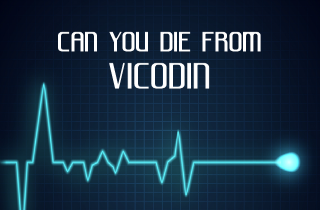Yes. Taking too much Vicodin can make you seriously ill or kill you.
Vicodin, a narcotic drug and prescription painkiller, contains two active ingredients. Both of these can cause an overdose. This is why it’s important to take Vicodin only at the recommended dosages and under the supervision of a doctor. Learn more about Vicodin ingredients, and dangers of overdose here. We invite your questions about taking Vicodin, Vicodin use, or possible problems with Vicodin at the end.
Dangers of Vicodin ingredients
Vicodin contains two painkilling drugs: acetaminophen (the active ingredient in Tylenol), and the opiate painkiller hydrocodone.
1. Acetaminophen – Acetaminophen is dangerous because in high doses it can cause severe liver damage. Not only can large amounts of acetaminophen cause an overdose, but chronic over-use can cause liver problems over time.
2. Hydrocodone – Hydrocodone is the ingredient found in Vicodin that is associated with addiction or abuse. Hydrocodone is what causes you to feel high on Vicodin. Hydrocodone is addictive and causes serious withdrawal symptoms when people stop taking the medication after long term use or abuse. Hydrocodone can cause loss of consciousness, a slowed rate of breathing, or even death.
Signs of Vicodin overdose
Serious side effects of taking Vicodin occur with when a person takes larger doses of Vicodin that prescribed. In cases of severe overdose on Vicodin, heart failure, circulatory collapse, and respiratory failure can all occur. Overdose on acetaminophen is especially dangerous, as an overdose is possible in some cases at fairly low doses (less than 10 grams). While sometimes the effects may not cause any symptoms until 48-72 hours after ingestion, A\acetaminophen overdose can cause symptoms of:
- excessive sweating
- general feeling of illness
- nausea
- vomiting
Hydrocodone also causes overdose symptoms, including:
- cold and clammy skin
- extreme drowsiness and possible loss of consciousness or coma
- changes in heart rate
- slowed breathing or difficulty breathing
How to treat Vicodin overdose
The treatment for Vicodin overdose depends on how recently a person took the pills and how many were taken. If Vicodin was taken recently, measures will be taken to reduce the absorption of the drug by inducing vomiting or pumping the stomach. In a hospital setting, respiratory and cardiac support will be provided as needed. Vitamin K may be administered if an acetaminophen overdose is preventing blood from clotting normally. A narcotic antagonist drug may be given to counteract the effects of the hydrocodone.
Are you taking too much Vicodin?
Because Vicodin is a drug that is addictive and builds a tolerance quickly (hydrocodone addicted drug), it is easy to understand how the drug can be misused. Even a person using Vicodin as prescribed may feel they need to take increased doses of the medication to get the same level of pain relief over time. Unfortunately, since acetaminophen is toxic at such low doses, this can do long-term damage to the liver. Just 10 grams of acetaminophen is considered toxic for most adults – less, in some cases.
Help for Vicodin use or misuse
If you’re taking more Vicodin than recommended, or abusing Vicodin recreationally, please talk to your doctor about treatments and programs to help curb the addiction. Therapy may be helpful, as well as support groups like Narcotics Anonymous. There is help available, if you look for it. Or ask us your questions about taking Vicodin or problems with Vicodin here. We will be happy to answer your questions with a personal and prompt response.









Related Posts